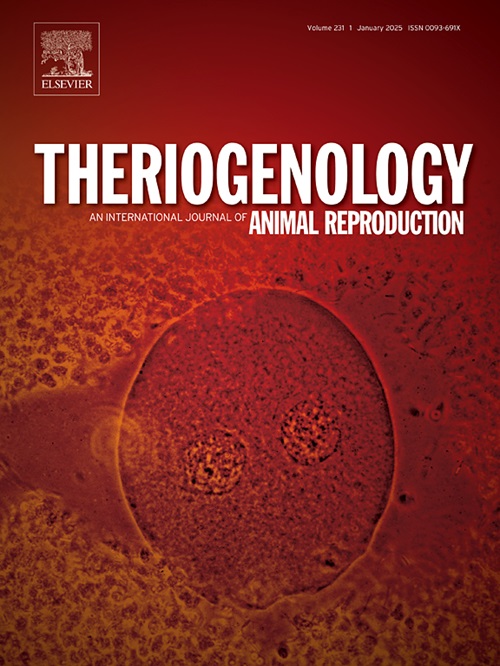The effect of cryopreservation on the turkey (Meleagris gallopavo) semen proteome
IF 2.5
2区 农林科学
Q3 REPRODUCTIVE BIOLOGY
引用次数: 0
Abstract
Two-dimensional difference in-gel electrophoresis coupled with matrix-assisted laser desorption/ionization mass spectrometry was employed to investigate the proteome alterations induced by equilibration and freezing/thawing processes, both in turkey spermatozoa and in extracellular fluid (ECF). The freezing/thawing process resulted in reduced semen quality parameters. Viability and motility decreased threefold (90.6 %–31.2 % and 76.0 %–26.7 %, respectively), while the proportion of live spermatozoa with intact mitochondrial membrane potential decreased fivefold (54.9 %–11.4 %). Additionally, oxidative stress increased sevenfold (10.5 %–68.8 %). A total of 146 differentially abundant protein spots were found between fresh and frozen/thawed spermatozoa, while 27 spots differentiated between fresh and frozen/thawed ECF. Immunofluorescence staining showed reduced signals of mitochondrial proteins, such as aconitate hydratase, alpha-enolase, glycerol-3-phosphate dehydrogenase, and triosephosphate isomerase, in the spermatozoa midpiece, as well as reduced signals of acrosin in the acrosome. Freezing/thawing affected mitochondrial energy metabolism, particularly the tricarboxylic acid (TCA) cycle and oxidative phosphorylation. The maintenance of an acetyl-CoA pool to sustain TCA cycle activity in cryopreserved spermatozoa may be insufficient owing to disturbances in fatty acid beta-oxidation and/or aerobic glycolysis. Changes in the ECF primarily reflect the leakage of spermatozoa glycolytic enzymes. The freezing/thawing process alters motile cilium assembly, primarily affecting the spermatozoa axoneme and outer dense fibres. The initial step of fertilization may be disrupted by alterations in proteins involved in spermatozoa binding to the ovum. These findings extend our knowledge of the molecular and cellular mechanisms of cryodamage in turkey semen which is prerequisite for the improvement of semen preservation procedures.

低温保存对火鸡精液蛋白质组的影响
采用二维凝胶电泳结合基质辅助激光解吸/电离质谱法研究了平衡和冷冻/解冻过程对火鸡精子和细胞外液(ECF)中蛋白质组的影响。冷冻/解冻过程导致精液质量参数降低。活力和活力下降了3倍(分别为90.6% - 31.2%和76.0% - 26.7%),而线粒体膜电位完整的活精子比例下降了5倍(54.9% - 11.4%)。此外,氧化应激增加了7倍(10.5% - 68.8%)。在新鲜和冷冻/解冻的精子中发现了146个差异丰富的蛋白质点,而在新鲜和冷冻/解冻的ECF中发现了27个差异丰富的蛋白质点。免疫荧光染色显示精子中部乌头酸水合酶、α -烯醇化酶、甘油-3-磷酸脱氢酶、三磷酸异构酶等线粒体蛋白信号降低,顶体顶蛋白信号降低。冷冻/解冻影响线粒体能量代谢,特别是三羧酸(TCA)循环和氧化磷酸化。由于脂肪酸β -氧化和/或有氧糖酵解的干扰,维持低温保存精子中乙酰辅酶a库以维持TCA循环活性可能不足。ECF的变化主要反映精子糖酵解酶的渗漏。冷冻/解冻过程改变了纤毛的运动组合,主要影响精子轴索和外层致密纤维。受精的最初步骤可能被精子与卵子结合过程中蛋白质的改变所破坏。这些发现扩展了我们对火鸡精液冷冻损伤的分子和细胞机制的认识,这是改进精液保存程序的先决条件。
本文章由计算机程序翻译,如有差异,请以英文原文为准。
求助全文
约1分钟内获得全文
求助全文
来源期刊

Theriogenology
农林科学-生殖生物学
CiteScore
5.50
自引率
14.30%
发文量
387
审稿时长
72 days
期刊介绍:
Theriogenology provides an international forum for researchers, clinicians, and industry professionals in animal reproductive biology. This acclaimed journal publishes articles on a wide range of topics in reproductive and developmental biology, of domestic mammal, avian, and aquatic species as well as wild species which are the object of veterinary care in research or conservation programs.
 求助内容:
求助内容: 应助结果提醒方式:
应助结果提醒方式:


